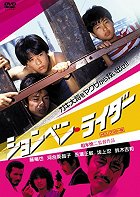Regie:
Shinji SōmaiKamera:
Masaki TamuraBesetzung:
藤竜也, Masatoshi Nagase, Masayuki Ibu, Ichirô Zaitsu, 倍賞美津子, Hideko Hara, Hiroaki Murakami, 寺田農, Michiko Kawai, Shinobu SakagamiInhalte(1)
Shinji Sōmai’s crazy movie about three teenagers who are saving their kidnapped classmate turns into an absurd formal anarchy full of lengthy breath-taking shots and child’s open-mindedness that contrasts with stiff social roles and pigeon-holed identities of the adult world. (Summer Film School)
Kritiken (2)
At first glance, it may seem that Shinji Sōmai’s third feature-length project was merely an attempt to repeat the enormous box-office success of Sailor Suit and Machine Gun. Produced by the same company, Kitty Films (though without the participation of Kadokawa Pictures), it was another vehicle for a new bunch of neophyte actors led by another idol, the teenage Michiko Kawai. However, a closer comparison with the previous hit reveals not only Sōmai’s versatility, but primarily the distinctiveness of the most broadminded and creatively bold work of the director’s filmography. P.P. Rider also has a coming-of-age narrative that sets the worlds of schoolchildren and adult gangsters against each other. Whereas Sōmai’s second film, in line with the story of growing up to soon, focused on the repression and indirect expression of emotions, P.P. Rider represents an eruption of childlike playfulness, boisterousness and anarchy, which spills over from the characters themselves into the formalistic construction of the individual scenes. The director pushes the boundaries of the expressiveness of the medium of film, freeing it from nonsense such as traditional style and the suggestion of reality, and instead stages a children’s adventure road movie conceived as a Dadaistically absurd celebration of broadmindedness. This is also reflected in the central motif of identity and its unrestrained fluidity in childhood and, conversely, the binding concepts and pigeonholes of adulthood. The motif of adolescence and the attempts to put it off despite its inevitability is presented through, among other things, the character of an androgynous girl who has people call her Bruce and the scenes in which various characters ask her about her gender, as well as through an excellent, quietly tense sequence at the beach in the morning, when she runs into the sea to hide her period. However, the central trio, on what may very well be their last summer vacation trip together, still has the possibility to put away the roles assigned to them by their school peers and the soul-crushing predetermination of adulthood, which is expressed in a brilliant twist, when they exchange clothes and thus swap identities (but also complicate viewers’ orientation in bigger shots). In addition to that, P.P. Rider deals with violence in both the worlds of children and gangsters. In both cases, the film proceeds from social roles and their hopelessness, though the consequences are fundamentally different. Again, it is summer vacation, a time of freedom, that nullifies the existing roles and spurs the protagonist on in their quest to avenge the wrongs perpetrated in the schoolyard. In a certain respect, P.P. Rider is a highwater mark in Sōmai’s filmography, but it is also a beautifully bizarre anomaly. This magnificently formalistic and joyously anarchic work was also Sōmai’s only collaboration with the masterful cinematographer Masaki Tamura and his only film based on an original screenplay, which was the joint work of Takuji Nishioka and the married couple Leonard and Chieko Schrader.
()
(weniger)
(mehr)
A film that reminded me why I got obsessed with Japanese cinema for a period of time years ago, and that motivates me to go back to it. A Japanese Aleksei German with a film where utter chaos feels completely natural. After all, it’s summertime and anything is possible.
()
